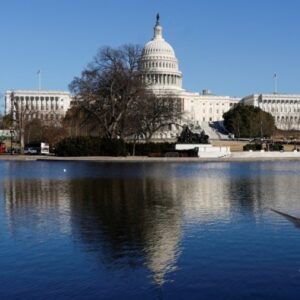
Unlock the Editor’s Digest for free
Roula Khalaf, Editor of the FT, selects her favourite stories in this weekly newsletter.
If the first global AI summit 15 months ago, hosted by Britain’s then prime minister Rishi Sunak, focused more on co-operation to tackle the risks of AI, the latest this week in Paris highlighted a shift in the dynamics: towards geopolitical competition, and the quest for technological and economic advantage. On his first foreign trip as US vice-president, JD Vance signalled that the US was ripping out the brakes and putting its foot to the floor to develop AI. The US, and the UK, did not sign up to a closing statement that said AI should be “inclusive, transparent, ethical and safe”. A new AI arms race has begun, with the US and China vying for dominance and Europe trying to carve out its role.
The Trump administration, said Vance, intended to cement US leadership and ensure that the “most powerful AI systems are built in the US, with American-designed and manufactured chips”. In a jibe at Europe’s legislate-first approach, he said regulatory regimes had to “foster the creation of AI technology rather than strangle it”; the US would not tolerate foreign governments “tightening the screws on US companies”. Without naming China, Vance also warned against signing AI deals with an “authoritarian master”.
The vice-president was speaking days after the director of the US AI Safety Institute stood down, raising uncertainty over its future. Donald Trump has also revoked President Joe Biden’s 2023 executive order calling for top AI companies to share information with the US government. The new US stance, says one academic, is a “180-degree turnaround” from Biden’s.
That strategic shift has coincided with a tilting of the balance of AI power. US confidence in its technological lead has been rattled by China’s DeepSeek, an AI model apparently developed more cheaply and with far less computing power than US counterparts. For now, China is seeking to play both sides. It is engaging with the EU on the global regulatory agenda. But it is also investing heavily in overcoming restrictions on its access to advanced microchips — and challenging US hegemony in AI.
Europe is still striving to assert itself as a player in the global AI race, and an alternative to the US and China. Some European executives have touted DeepSeek — along with France’s Mistral — as evidence that cheaper, open-source models could provide an opportunity for the continent. French President Emmanuel Macron, who hosted the conference, spoke in favour of open, shared AI platforms, criticised closed US models and announced big investments in AI infrastructure in France. But, while EU rules may not be quite as stifling as the US vice-president claims, Europe has other obstacles — including a shortage of “blitzscaling” capital to rapidly build out start-ups.
Britain has denied that its own puzzling failure — as the organiser of the first AI summit — to sign the final communique, when 57 countries including China and India plus the EU did so, reflected a decision to side with the Trump White House. The government insists it was because the statement did not provide enough “practical clarity” on global AI governance or address “harder questions” on national security.
Whichever is true, the case for collaborative governance of the new technology — especially the goal of human-level intelligence — is powerful, given its vast potential benefits and risks. No one would wish to see its development strangled by excessive regulation, or an authoritarian China become dominant. But America’s apparent readiness to dismantle guardrails that were being put in place represents a bold, potentially reckless, bet — that it can master this game-changing technology first, without anything going wrong along the way.




